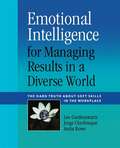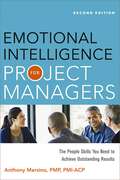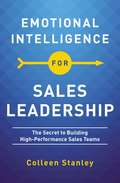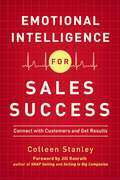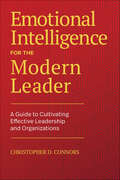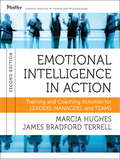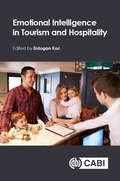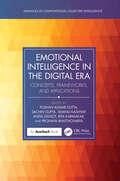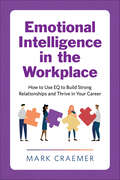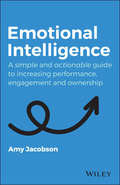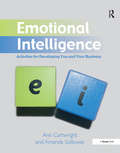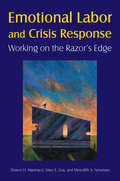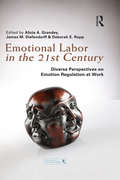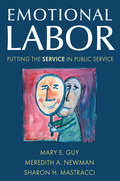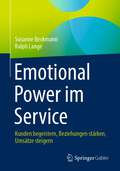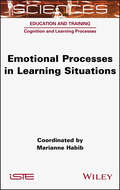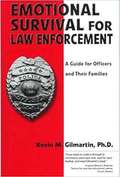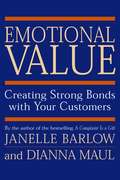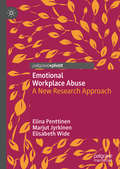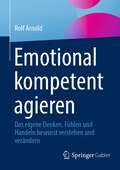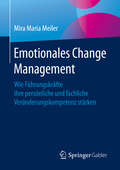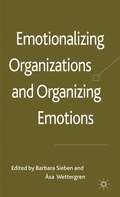- Table View
- List View
Emotional Intelligence for Managing Results in a Diverse World: The Hard Truth About Soft Skills in the Workplace
by Anita Rowe Lee Gardenswartz Jorge CherbosqueEncountering generational, cultural, language and behavioral differences in today's global workplace occurs nearly every hour of every day. From here to Dubai or in the conference room down the hall, anger and frustration come easily when others don't do things our way, follow directions, or respond the way we think they should. And when emotions manage workplace relationships, conflict, disengagement and low morale result. Answering the call for fresh insight into what it takes to effectively manage in this complex landscape, Emotional Intelligence for Managing Results in a Diverse World brings together a unique combination - the key principles of emotional intelligence and the fundamentals of diversity and difference. With practical how-tos, action tips, assessment tools and plenty of workplace examples, this cohesive system offers managers, supervisors, team leaders and human resource professionals a proven framework and actionable strategies for developing the critical competencies needed for success: empathy, cross-cultural communication and conflict resolution skills that produce hard results in business. Emotional Intelligence for Managing Results in a Diverse World delivers a proven approach to capturing and using the energy of emotions to bridge difference, turn difficult relationships into satisfying ones and create a healthier workplace and a more effective organization
Emotional Intelligence for Project Managers: The People Skills You Need to Acheive Outstanding Results
by Anthony MersinoResearch indicates that emotional intelligence (EI) accounts for an astonishing 70-80 percent of management success. Technical expertise just isn't enough anymore: project managers need strong interpersonal skills and the ability to recognize emotional cues in order to lead their teams to success. Emotional Intelligence for Project Managers introduces readers to all facets of EI and shows how emotions can be leveraged to meet project goals. They'll learn how to: * Set the tone and direction for the project * Communicate effectively * Motivate, inspire, and engage their team * Encourage flexibility and collaboration * Deal productively with stress, criticism, and change * Establish the kind of high morale that attracts top performers * And more. The second edition includes several expanded sections on self-awareness and self-management, as well as a new chapter on using EI to lead Agile Teams and a close look at Servant Leadership. Without the people skills necessary to lead effectively, even the most care fully orchestrated project can fall apart. This indispensable guide gives project managers the tools they need to create winning teams and get the job done right and on time.
Emotional Intelligence for Sales Leadership: The Secret to Building High-Performance Sales Teams
by Colleen StanleyDevelop the critical soft skills required for high-performance sales…Chronic complainers, no accountability finger-pointers, or learning-resistant laggards—these culture-killers costs sales organizations more in productivity than being weak in the so-called hard skills of selling. Learn how emotional intelligence and the development of these critical soft skills improve sales leadership effectiveness and outperforms doubling down on more sales technology tools and fads.The missing link is in hiring for and developing emotional intelligence skills in sellers and sales leaders. Emotional Intelligence for Sales Leadership will connect with anyone charged with growing sales in business-to-business or business-to-consumer sales.Emotional Intelligence for Sales Leadership:Shows sales leaders why &‘real world&’ empathy and emotion management are the key to building strong relationships with their sales team. Offers simple steps on how sales leaders create sales cultures that embrace feedback and change through the development of critical emotional intelligence skills.Provides guidance on how to identify key emotional intelligence skills needed in your hiring process to build resilient sales teams.Walks readers through the process of training sales teams on soft skills that ensure the consistent execution of the right selling behaviors.
Emotional Intelligence for Sales Success: Connect with Customers and Get Results
by Colleen StanleyEven skilled salespeople buckle in tough selling situations getting defensive with prospects who challenge them on price or too quickly caving to discount pressure. Those are examples the fight-or-flight response something salespeople learn to avoid when they build their emotional intelligence. Studies have shown that emotional intelligence (EI) is a strong indicator of success. In Emotional Intelligence for Sales Success, sales trainer and expert Colleen Stanley shows how closely EI is tied to sales performance and how salespeople can sharpen their skills to maximize results. Readers will discover: How to increase impulse control for better questioning and listening The EI skills related to likability and trust How empathy leads to bigger sales conversations and more effective solutions How emotional intelligence can improve prospecting efforts The EI skills shared by top sales producers And much more Emotional intelligence plays a vital role at every stage of the sales process, from business development to closing the deal. When customers can get product information and price comparisons online, the true differentiator is the ability to deftly solve problems and build relationships EI territory!
Emotional Intelligence for the Modern Leader: A Guide to Cultivating Effective Leadership and Organizations
by Christopher D. ConnorsDiscover the secret to business success and transform your career—starting today Success requires more than hard work and good ideas: you need to be able to understand, inspire, and motivate those around you. Emotional Intelligence for the Modern Leader helps you hone your emotional intelligence (EQ)—the ability to be aware of, control, and express your emotions, as well as handle interpersonal relationships empathetically—and enhance your ability to lead.Building off proven research, this user-friendly guide teaches you the pillars of high-EQ leadership. Whether it's developing self-awareness or bolstering empathy, discover simple and easy-to-use exercises that you can make use of on your own. You'll even learn about emotionally intelligent leaders and how they've utilized this skill as part of their successes.Emotional Intelligence for the Modern Leader includes:Emotionally intelligent leadership—Find out what it means to lead with high EQ and how you can make it part of your organization's culture.Your leadership style—Determine what your professional leadership style is and how that affects the people around you.Growing your emotional intelligence—Take advantage of exercises and self-assessment tools that allow you to effectively and efficiently improve your abilities.Become the leader you've always wanted to be with this emotional intelligence enhancing guide.
Emotional Intelligence in Action: Training and Coaching Activities for Leaders, Managers, and Teams
by James Bradford Terrell Marcia HughesThe importance of emotional intelligence as a critical factor in personal and business success is now well established. Emotional Intelligence in Action, Second Edition shows how to tap the power of EI to build effective emotional skills and create real change for leaders and teams. This book breaks new ground in providing a cross-reference matrix that maps sixty-five exercises to four leading emotional intelligence models – the EQ-I 2.0 or EQ360, TESI and TESI Short, the MSCEIT, and EISA – making it easy to use with all the models. Revised to respond to the significant changes in EQi-2.0 and to add two new instruments, TESI and EISA, this Second Edition now offers in-depth coverage of such emerging topics as emotional expression, as well as twenty new exercises, accompanied by reproducible handouts for your participants. Ideal for both individual or team coaching or as part of a wider leadership and management development program, Emotional Intelligence in Action, Second Edition provides highly-effective experiential learning, drawn from real life, that will help you enhance emotional intelligence competencies in every organization.
Emotional Intelligence in Tourism and Hospitality
by Erdogan KocEmotional intelligence is the capability to recognize, use and manage one's own emotions and those of others. The use of emotional information guides thinking and behaviour, allowing adjustment of emotions to adapt to environments. As tourism and hospitality services are produced and consumed simultaneously, with a high level of contact between employees and customers, the development of emotional intelligence of employees in tourism and hospitality establishments is vital. This book has a skills-based approach and explains how emotional intelligence can be developed in tourism and hospitality students and employees. Key features: A foreword by Gill Hasson The first tourism and hospitality book to describe emotional intelligence Covers all major literature, concepts, theories and research findings from the perspective of emotional intelligence. Includes exercises, end of chapter questions, practical examples, student aids and Powerpoint slides for each chapter that can be used in class by academicians and practitioners in their training sessions. The book is intended for use by tourism and hospitality students, researchers and practitioners.
Emotional Intelligence in Tourism and Hospitality
by Erdogan KocEmotional intelligence (EI) is the ability to recognize emotions, thereby guiding behavior and allowing emotional adjustment to environments. As services are produced and consumed simultaneously, the employee EI is vital. This book uses a skills-based approach to explain how emotional intelligence can be developed in tourism and hospitality.
Emotional Intelligence in the Digital Era: Concepts, Frameworks, and Applications (Advances in Computational Collective Intelligence)
by Anita Gehlot Sachin Gupta Pronaya Bhattacharya Pushan Kumar Dutta Shafali Kashyap Rita KarmakarWith research perspectives on elements of psychology and technology, Emotional Intelligence in the Digital Era: Concepts, Frameworks, and Applications provides insight into the intersection of emotional intelligence and digital technologies, including artificial intelligence (AI). It explains how technology has the potential to enhance emotional intelligence and promote positive psychological outcomes. It also discusses the role of technology in facilitating social connections that support mental health and promote self-reflection and personal growth.The main themes explored in the book revolve around understanding human psychology in the context of digital technology in the post-pandemic environment. The book delves into how emotional intelligence plays a crucial role in adapting to virtual environments. It also examines how AI and other digital technologies can enhance engagement and effectiveness. Emphasizing the need for a balanced approach to integrating technology in the field of psychology, the book highlights the potential benefits of technology in promoting emotional intelligence and positive psychological outcomes while also acknowledging the potential risks and ethical considerations associated with its use.Covering such aspects of human psychology as cognitive and emotional processing, personality, motivation, and decision-making, the book discusses the role of technology in improving human psychological perspectives and emotional intelligence, especially within a post-pandemic context. It also examines the use of virtual reality, teletherapy, and other digital tools in mental health interventions. Written for researchers, academics, and mental health professionals, the book is a deep dive into research investigating human psychology, emotional intelligence, and technology.
Emotional Intelligence in the Workplace: How to Use EQ to Build Strong Relationships and Thrive in Your Career
by Mark CraemerPractical strategies to develop your emotional intelligence for career successEmotional intelligence refers to your skill at identifying and effectively responding to what you, and the people around you, are thinking and feeling—and it's especially important in professional settings. Emotional Intelligence in the Workplace is your guide to developing your emotional intelligence, with actionable advice and exercises that help you make empathetic decisions, manage stress, resolve conflict, and maintain productive working relationships.Emotional Intelligence in the Workplace includes:The power of connection—Learn why emotional intelligence is so critical for collaboration and success, along with easy ways to practice self-awareness, develop flexibility, read a room, and more.Real-world examples—Find anecdotes and example scenarios that show you the techniques in action and explain how they help build reputation and trust.Ways to grow and thrive—Discover how increased emotional intelligence opens doors for new opportunities and career advancement.Explore what it means to be emotionally intelligent and actionable ways to apply it for professional success.
Emotional Intelligence: A Simple and Actionable Guide to Increasing Performance, Engagement and Ownership
by Amy JacobsonBoost Emotional Intelligence in any situation to achieve exceptional results for any organisation As organisations around the world are putting more focus on the mindset and wellbeing of staff, the need to develop Emotional Intelligence (EI) has never been greater. Emotional Intelligence in the workplace—including the five key concepts of self-awareness, self-regulation, empathy, social skills and motivation—is defined as your ability to identify and manage your personal emotions and the emotions of your colleagues and co-workers. Emotional Intelligence is in high demand and is expected to become an essential component of success in the future of work. Emotional Intelligence: A Simple and Actionable Guide to Increasing Performance, Engagement and Ownership is designed to help you master EI and empower you to achieve the very best outcome for everyone in your organisation. Cutting through the hype and dispelling the myths about EI, this practical, easy-to-use resource provides clear guidance, powerful tools, and actionable steps for developing and implementing EI in the workplace for immediate results. Amy Jacobson, an experienced EI specialist, leadership trainer and coach, shares the tools, methodologies, concepts and actions that increase EI in any situation. Packed with real-life examples and case studies, insightful questions, and useful diagrams to create action, this must-have guide: Offers a powerful 5-part methodology—Own It, Face It, Feel It, Ask It, and Drive It—to help you understand and immediately implement Emotional Intelligence principles in both your personal and professional life Increases your Emotional Intelligence in the workplace to enable you to inspire and energise staff, support empathy and self-awareness, and drive high levels of performance Improves the way you handle high pressure environments, manage challenging situations, and interact with people with different communication styles Helps you solve difficult problems in the workplace such as loss of purpose and engagement, cultural issues, poor communication, and low productivity Provides concrete steps for eliminating negative behaviors and for owning the role you play, your impact on others, and the decisions and choices you make Emotional Intelligence: A Simple and Actionable Guide to Increasing Performance, Engagement and Ownership is an indispensable book for anyone interacting with others in the workplace, especially those with leadership roles such as senior executives, board members, department heads, managers and supervisors.
Emotional Intelligence: Activities for Developing You and Your Business
by Ann Cartwright Amanda SollowayBuilding rapport, communicating and establishing trust with people, as a line manager, as part of a department or a temporary project team, involves a fundamental set of human and business skills. And yet this set of skills is also the area where the majority of managers feel least equipped to cope. Emotional intelligence is, at its heart, all about self-awareness; an understanding of how people relate and respond to you. This collection of training activities provides managers and employees with a series of proven exercises for raising personal and social awareness, skills for managing self and relationships with others. Each activity includes detailed instructions for the user or facilitator as well as copies of any handout materials. The collection is available as a looseleaf manual or on CD ROM.
Emotional Labor and Crisis Response: Working on the Razor's Edge
by Mary E. Guy Sharon H. Mastracci Meredith A. NewmanThe author's of the award-winning Emotional Labor now go inside the stressful world of suicide, rape, and domestic hotline workers, EMTs, triage nurses, and agency/deparment spokespersons, to provide powerful insights into how emotional labor is actually exerted by public servants who face the gravest challenges.
Emotional Labor in the 21st Century: Diverse Perspectives on Emotion Regulation at Work (Organization and Management Series)
by Deborah E. Rupp Alicia A. Grandey James M. DiefendorfThis book reviews, integrates, and synthesizes research on emotional labor and emotion regulation conducted over the past 30 years. The concept of emotional labor was first proposed by Dr. Arlie Russell Hochschild (1983), who defined it as "the management of feeling to create a publicly observable facial and bodily display" (p. 7) for a wage. A basic assumption of emotional labor theory is that many jobs (e.g., customer service, healthcare, team-based work, management) have interpersonal, and thus emotional, requirements and that well-being and effectiveness in these jobs is determined, in part, by a person’s ability to meet these requirements. Since Hochschild’s initial work, psychologists, sociologists, and management scholars have developed distinct theoretical approaches aimed at expanding and elaborating upon Hochschild’s core ideas. Broadly speaking, emotional labor is the study of how emotion regulation of oneself and others influences social dynamics at work, which has implications for performance and well being in a wide range of occupations and organizational contexts. This book offers researchers and practitioners a review of emotional labor theory and research that integrates the various perspectives into a coherent framework, and proposes an agenda for future research on this increasingly relevant and important topic. The book is divided into 5 main sections, with the first section introducing and defining emotional labor as well as creating a framework for the rest of the book to follow. The second section consists of chapters describing emotional labor theory at different levels of analysis, including the event, person, dyad, and group. The third section illustrates the diversity of emotional labor in distinct occupational contexts: customer service (e.g. restaurant, retail), call centers, and caring work. The fourth section considers broader contextual influences – organizational-, societal-, and cultural-level factors – that modify how and when emotional labor is done. The final section presents a series of ‘reflective essays’ from eminent scholars in the area of emotion and emotion regulation, where they reflect upon the past, present and future of emotion regulation at work.
Emotional Labor: Putting the Service in Public Service
by Mary E. Guy Sharon H. Mastracci Meredith A. NewmanMost public service jobs require interpersonal contact that is either face-to-face or voice-to-voice - relational work that goes beyond testable job skills but is essential for job completion. This unique book focuses on this emotional labor and what it takes to perform it.The authors weave a powerful narrative of stories from the trenches gleaned through interviews, focus groups, and survey data. They go beyond the veneer of service delivery to the real, live, person-to-person interactions that give meaning to public service.For anyone who has ever felt apathetic toward government work, the words of caseworkers, investigators, administrators, attorneys, correctional staff, and 9/11 call-takers all show the human dimension of bureaucratic work and underscore what it means to work "with feeling."
Emotional Power im Service: Kunden begeistern, Beziehungen stärken, Umsätze steigern
by Susanne Beckmann Ralph LangeDieses Buch verrät, wie Sie Ihre Kunden begeistern und Geschäftskontakte zu unvergesslichen Erlebnissen machen. Susanne Beckmann und Ralph Lange präsentieren in ihrem Buch die geballte Erfahrung aus über 20 Jahren Praxis für eine Transformation in Ihrem Unternehmen. Wie kann New Work Ihren Service verändern und wie leiten Sie einen Kulturwandel hin zu wirklich exzellenter Kundenorientierung ein? Emotional Power verbindet innovative Ansätze mit bewährten Techniken, die Ihre Kunden und Mitarbeiter gleichermaßen stärken.Das Besondere an Emotional Power? Es ist kein typischer Ratgeber. Die Autoren setzen auf Authentizität und scheuen sich dabei nicht, Humor als Werkzeug einzusetzen. Denn, wie sie betonen (nach Guy de Maupassant): „Es sind die Begegnungen mit Menschen, die das Leben lebenswert machen.“ Und genau das ist der Kern von Emotional Power – Menschen begegnen und dabei begeistern. Erleben Sie, wie Kundenbeziehungen aufblühen und werden Sie Teil dieser Bewegung – für begeisterte Kunden, motivierte Mitarbeiter und nachhaltige Umsätze.
Emotional Processes in Learning Situations
by Marianne HabibEmotional processes are increasingly studied in psychology, whether through their modes of expression or through their effect on cognitive processes. While the theorization of the link between emotional and cognitive processes has varied over the centuries, the impact of emotions on cognitive functions is now undeniable and is supported by experimental arguments. Psychological processes are currently considered necessary for, or influenced by, the emergence of emotions. Learning is at the heart of individual development and involves different cognitive processes; the study of the emotional processes at work in a learning situation must of course not be overlooked.This book presents the contributions of different disciplines of psychology in understanding the role of emotional processes in learning situations, from a developmental and whole-life perspective.
Emotional Survival For Law Enforcement: A Guide For Officer And Their Families
by Kevin M. GilmartinEmotional survival for law enforcement: A guide for officers and their families
Emotional Tagging: How Our Mental Processes Increase the Likelihood of Making Flawed Decisions
by Sydney Finkelstein Jo Whitehead Andrew CampbellWhen someone makes a bad decision, it is often said that that person let his emotions get in the way of clear judgment. According to the authors, it is true that the brain's decision making processes rely heavily on emotions. When the brain stores a memory of an event or action, it also stores an associated emotion with it. This is called "emotional tagging," an unconscious process that helps us assess a situation and identify a suitable action plan. But emotions can sometimes lead to disaster. This chapter explains how emotions can be a double-edged sword, both helping us to make brilliant decisions and fooling us into flawed decisions. The authors look at several examples, including the flawed decision that led to the demise of Wang Laboratories. This chapter was originally published as chapter 3 of "Think Again: Why Good Leaders Make Bad Decisions and How to Keep It From Happening to You."
Emotional Value: Creating Strong Bonds with Your Customers
by Janelle Barlow Dianna MaulSociety is rapidly moving from a service economy to an experience economy. As a result, today's more sophisticated consumers not only demand services and products that are of the highest quality; they also want positive, emotionally satisfying experiences. The companies and institutions that learn how to add emotional value to their customers' experiences will leave their competitors behind. This book details a practice for adding emotional value to customers' experiences and to those of staff. The practices show that by understanding the critical role emotions play in creating customer experiences, organizations can take their service to new levels.
Emotional Workplace Abuse: A New Research Approach
by Elina Penttinen Marjut Jyrkinen Elisabeth WideAddressing emotional workplace abuse, this Palgrave Pivot takes a multidisciplinary approach which combines feminist research on violence with organisation and management studies, in order to offer a new approach on workplace violations. The book analyses why it is difficult for targets and organisations alike to name and identify emotional abuse and addresses the severe negative effects of abuse on the targets’ lives. It brings ethical leadership to the fore as a means to foster sustainable organisations. Using empirical data and research, this book highlights subtle forms of violations that take place in the workplace, and provides analysis from the perspective of the target. A valuable read for scholars and practitioners involved in organisational management and HRM, Emotional Workplace Abuse will help readers to understand the importance of sustainable leadership in preventing emotional workplace abuse.
Emotional intelligent führen: Authentisch, motivierend, wirksam
by Markus Müllner Caroline MüllnerWer als Führungskraft erfolgreich sein will, muss Mitarbeiter, Kollegen und Vorgesetzte für sich und die Ziele des Unternehmens gewinnen. Gerade in disruptiven Zeiten gelingt das nicht allein mit Fakten. Vielmehr braucht es positive Emotionen, intrinsische Motivation und mentale Stärke. Das vorliegende Buch ist ein Plädoyer für ein zeitgemäßes Führen, bei dem emotional intelligentes Verhalten den Unterschied macht. Aufbauend auf ihrer langjährigen Führungs-, Berater- und Dozentenerfahrung verbinden die Autoren aktuelle St. Gallener Managementkonzepte mit neuen Erkenntnissen aus der Verhaltensökonomie und der Positiven Psychologie. Das Buch wartet mit vielfältigen praktischen Beispielen und Übungen auf. Der Leser wird dabei aufgefordert, sich selbst in konkreten Führungs- und Selbstführungssituationen zu reflektieren.
Emotional kompetent agieren: Das eigene Denken, Fühlen und Handeln bewusst verstehen und verändern
by Rolf ArnoldDieses Buch beschreibt mit dem Modus des Agil-Seins („Being agile“) eine Form des geübten Umgangs mit sich selbst und anderen, der uns dazu verhelfen kann, zu werden, wer wir eigentlich sind. Das Konzept „Being agile“ verhilft insbesondere Führungskräften zu einer Persönlichkeitsentwicklung, die sie zu sich selbst kommen lässt. Es zeigt auf, welche Konsequenzen sich aus der Analyse und der nachhaltigen Transformation des eigenen Denkens, Fühlens und Handelns ergeben. Dabei (er)finden wir uns selbst und ermöglichen uns einen professionellen Umgang mit uns selbst und anderen. Dies schafft auch die Voraussetzungen dafür, dass unser Gegenüber so in Erscheinung treten kann, wie es gemeint ist oder sich selbst meint. Lassen Sie sich ermutigen, sich von alten Mustern zu lösen und zu wirksamen Formen der Kooperation und Kommunikation vorzustoßen.
Emotionales Change Management: Wie Führungskräfte ihre persönliche und fachliche Veränderungskompetenz stärken
by Mira Maria MeilerVeränderungen und deren emotionale Komponente Dieses Buch vermittelt Ihnen mehr Sicherheit in Zeiten des Wandels und mehr Vertrauen in die eigene Veränderungskompetenz – durch eine ganzheitliche Perspektive auf Veränderungen. Anhand eines typischen Veränderungszyklus und persönlicher Erfahrungen erläutert die Autorin, was man in verschiedenen Phasen der Veränderung von der ersten Ahnung bis zur konkreten Umsetzung – insbesondere auf menschlicher und emotionaler Ebene – beachten kann. Fast alle arbeitenden Personen, insbesondere Führungskräfte in mittleren und oberen Positionen sind gezwungen, sich mit den zunehmenden Veränderungen hinsichtlich Markt, Geschäftsausrichtung und Zusammenarbeit zu beschäftigen. Lernen Sie, Ihre eigenen Lebensgeschichten zu reflektieren und daraus wertvolle Fähigkeiten und Erfahrungen für Ihre beruflichen Herausforderungen zu nutzen. Dieses Buch richtet sich an den Menschen in der Führungskraft und gibt wertvolle Hinweise, wie Führungskräfte selbst besser mit Veränderungen – im privaten und beruflichen Umfeld – umgehen und andere besser durch diese begleiten können. Zahlreiche Beispiele aus Change-Projekten und Praxis-Tipps gemischt mit persönlichen Anekdoten der Autorin, authentischen Geschichten und philosophischen Anmerkungen machen das Buch zu einer fachlich interessanten und gleichzeitig unterhaltsamen Lektüre. Erfahren Sie mehr über die sieben Phasen des Veränderungszyklus:Die Dämmerung einer VeränderungDie ErkenntnisDer erste SchrittSie müssen nicht alles allein schaffenEine Richtung finden Die geraden Wege sind nicht immer die bestenDie Masse bewegt sich
Emotionalizing Organizations and Organizing Emotions
by Barbara Sieben Åsa WettergrenDelivers a strong contribution to the field of research on emotions in organizations offering original pieces of research. Uniting scholars from organization and management research and sociology, it conveys trans-disciplinary insights into the multidimensional 'nature' of emotion and its appearance in organizational structures and processes.
